Escalating Tensions in Manipur: Naga Fury Over Kuki Militant Camp Relocation Amid SoO Extension
CONFLICT
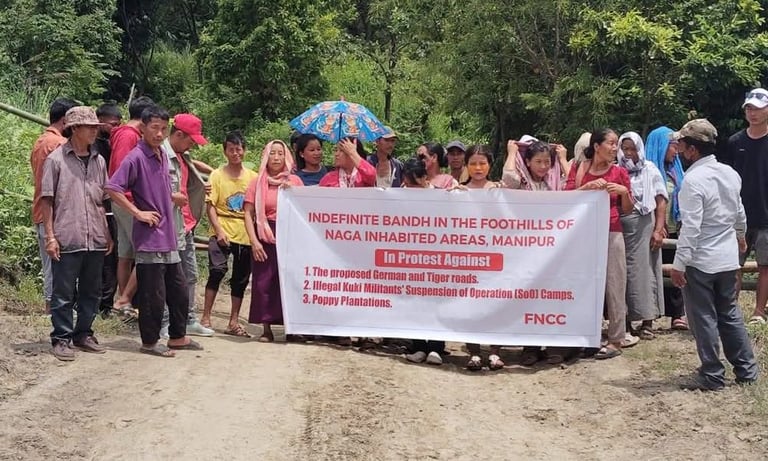

Imphal: As Prime Minister Narendra Modi's highly anticipated visit to Manipur approaches – his first since the ethnic violence erupted in May 2023 – the state stands on the brink of renewed conflict. The recent extension of the tripartite Suspension of Operations (SoO) agreement with Kuki-Zo militant groups has sparked fresh outrage, particularly among the Naga community, who allege that the relocation of designated militant camps encroaches on their ancestral lands. Intended to address Meitei concerns by moving camps away from valley areas, this decision has instead deepened ethnic tensions in the hill districts, jeopardizing fragile peace efforts.
Image: Protests led by FNCC
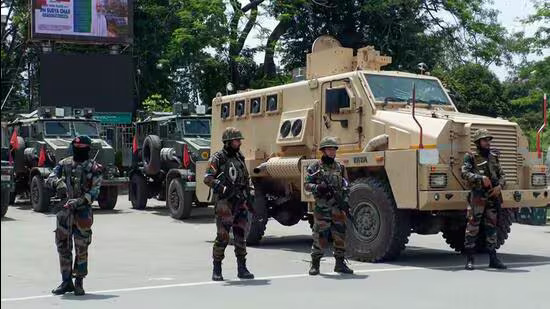

The SoO agreement, signed in 2008 between the Government of India, the Manipur government, and umbrella organizations representing 25 Kuki-Zo insurgent groups – including the Kuki National Organisation (KNO) and United People's Front (UPF) – has long been a divisive tool for managing militancy in the Northeast. It requires militants to cease hostilities, deposit arms in monitored camps, and participate in peace talks, in return for immunity from security operations. The annually extended pact covers approximately 2,266 cadres across 14 designated camps in Manipur's hill regions.
However, critics, including Meitei civil society group Coordinating Committee on Manipur Integrity (COCOMI), label it a "deceptive pact" that shields "narco-terrorist" activities, citing alleged involvement of SoO groups in drug trafficking, extortion, and the 2023 Meitei-Kuki clashes, which claimed over 250 lives and displaced 60,000 people.
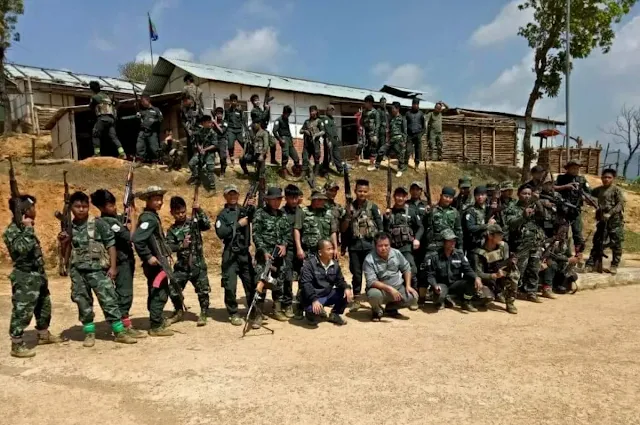

On September 4, 2025, the Centre, Manipur government, and Kuki-Zo representatives signed a renewed one-year extension in New Delhi, introducing "re-negotiated ground rules" to restore peace and reopen National Highway 2 (NH-2), a critical lifeline blocked since the violence began. Key changes include reducing camps from 14 to seven, relocating them farther from Meitei-inhabited plains to reduce tensions, and establishing buffer zones. Manipur Chief Secretary Vineet Kumar Goyal stressed that the pact preserves the state's territorial integrity and aims to normalize supplies along NH-2, which the Kuki-Zo Council (KZC) pledged to unblock for goods and commuters. Security sources hailed the KZC's cooperation as a "confidence-building measure" ahead of Modi's visit.
However, the Kuki-Zo Council issued a press statement countering that NH-2 was never closed to commuters or goods but will remain prohibited to the Meitei community until a final resolution is reached, undermining the government's narrative.
The relocation plan has also provoked a fierce backlash from the Naga community, dominant in foothill areas like Kangpokpi and Ukhrul. The Foothills Naga Coordination Committee (FNCC) released a scathing press statement on September 7, denouncing reports that the "Thingsat" camp – housing Kuki militants under Kangpokpi police station – would shift to Kharam Vaiphei village (Naga ancestral land) and be renamed "Lhangkichoi." The FNCC called it a "total undermining" of Naga rights, accusing the government of offering a "safe haven" to militants despite assurances to respect indigenous land ownership.
Image: Representative Picture of Central Forces in Manipur
Image: Representative Picture of Kuki-Zo insurgent groups
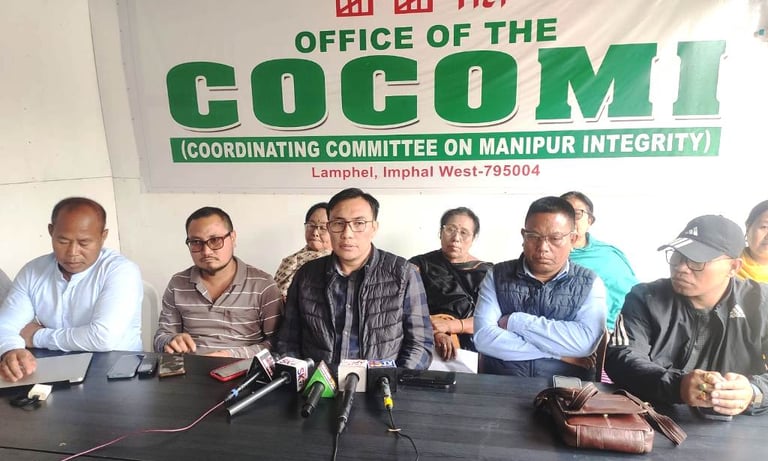

Image: Representatives of COCOMI
"This development is not only an insult to FNCC but a total undermining of the rights of the Naga people," the statement declared, referencing the SoO pledges and the Manipur government's August 2025 assurances during Naga protests against unauthorized road construction and poppy cultivation. The FNCC warned of "inevitable bloodshed" if the shift proceeds, holding the government accountable for any Kuki-Naga violence. They threatened to close the vital road through Naga lands – a Kuki lifeline – and evict "illegal Kuki villages" built without consent, alleging misuse of Naga land for "drug trafficking and illegal smuggling" that has amassed "unimaginable wealth" against indigenous Nagas.
This reflects broader Naga discontent. In July 2025, the FNCC imposed an indefinite bandh in foothill areas, protesting "German-Tiger roads" linking Kuki-dominated Churachandpur to Kangpokpi, SoO camp encroachments, and poppy farms, though it was lifted after government talks. The timing, ahead of Modi's visit, fuels perceptions of Delhi's "appeasement policy" toward Kukis. The United Naga Council (UNC) has long opposed Kuki expansions, citing deadly 1990s clashes over overlapping "homeland" claims.
Meitei groups, already furious over the SoO renewal, see it as a betrayal of the Manipur Assembly's February 2024 resolution to abrogate the pact, alleging Kuki militant violations during the 2023 violence. COCOMI reiterated on September 5 that it "legitimizes Chin-Kuki narco-terrorists" and demanded abrogation to tackle drug syndicates. Even some Kuki factions, like Thadou Inpi Manipur, expressed disappointment over ignored calls for abrogation.
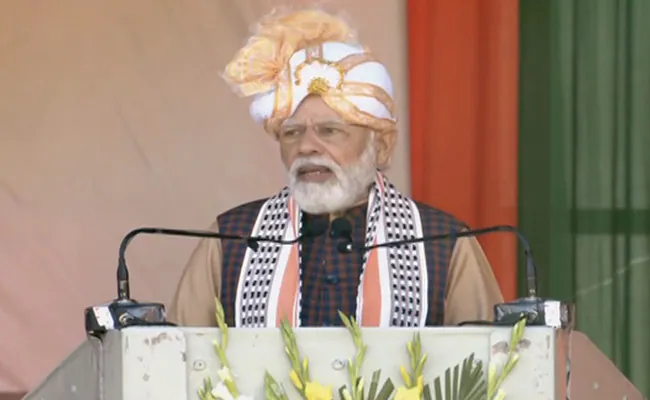

Image: Prime Minister of India Narendra Modi
Modi's visit, set for September 13 after inaugurating Mizoram's Bairabi-Sairang railway, is contentious. Congress leader Jairam Ramesh called a rumored three-hour itinerary a "non-visit" and "insult" to Manipur's suffering populace, who have endured 29 months, over 260 deaths, and ongoing displacement. Preparations at Imphal's Kangla Fort and Churachandpur's Peace Ground include heightened security, but analysts warn the SoO fallout could overshadow the event. "This is Kuki appeasement at Naga and Meitei expense," a senior Naga leader said, highlighting risks of a three-way ethnic flare-up.
Under President's Rule since February 2025, extended to January 2026, Manipur's administration struggles with fragmented communities divided by buffer zones. While the SoO extension seeks to stabilize NH-2 and support 58,000 displaced persons, Naga threats of road closures and evictions underscore how one group's gain fuels another's grievance. As Modi prepares to address Meitei and Kuki gatherings, Delhi must mediate land disputes and enforce rules, or his visit may offer fleeting hope rather than lasting peace in this volatile region.
